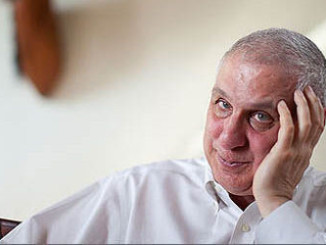 During the turbulent 1960s, no figure was perhaps more controversial than former Secretary of Defense Robert McNamara. A polarizing figure, hailed as a genius by some while regarded by others as a con man or madman, McNamara oversaw the escalation of the conflict in Vietnam first for President John Kennedy and then for his successor, Lyndon Johnson.
During the turbulent 1960s, no figure was perhaps more controversial than former Secretary of Defense Robert McNamara. A polarizing figure, hailed as a genius by some while regarded by others as a con man or madman, McNamara oversaw the escalation of the conflict in Vietnam first for President John Kennedy and then for his successor, Lyndon Johnson.
But whether genius or madman, sinner or saint, McNamara was a key witness to some of the most tumultuous and key moments of the 1960s and as such, has unique insight into that decade. This is what makes the documentary The Fog Of War: Eleven Lessons From The Life Of Robert McNamara one of the most compelling feature films of the past few years. More than just a talking head interview, director Errol Morris utilizes archive photographs and film footage to both punctuate and counterpoint McNamara’s monologue.
McNamara takes us through his entire military career, starting with his position as a statistical analyst during World War II where he participated in the planning of the firebombing of Tokyo and other Japanese cities to his Presidential cabinet position. Some of his reflections are quite frank and may surprise his critics. “If we had lost the war we would have been persecuted as war criminals,” he states when talking about the Tokyo fire bombings. Hearing McNamara question the morality of actions taken during what is universally accepted as a just war is as thought provoking as it is unsettling.
 At this stage in his life McNamara seems to be able to take a hard look back and make some honest assessments about things he has seen and done. The enormity of some of the things he helped see the country still seems to frighten him today. “In my seven years as Secretary of Defense, we came within a hair’s breadth of war with the Soviet Union three times, “ he states. “I lived the Cold War 365 days a year, 24 hours a day. Hell, it was a hot war.” At another point in the film McNamara says, “Any military commander honest with himself will admit that he’s made mistakes and killed people. But there’s no learning curve with nuclear weapons.”
At this stage in his life McNamara seems to be able to take a hard look back and make some honest assessments about things he has seen and done. The enormity of some of the things he helped see the country still seems to frighten him today. “In my seven years as Secretary of Defense, we came within a hair’s breadth of war with the Soviet Union three times, “ he states. “I lived the Cold War 365 days a year, 24 hours a day. Hell, it was a hot war.” At another point in the film McNamara says, “Any military commander honest with himself will admit that he’s made mistakes and killed people. But there’s no learning curve with nuclear weapons.”
One of McNamara’s lessons states, “In order to do good, you may have to engage evil,” which leads to the question, “How much evil do we have to do to do good?” While McNamara clearly admits that mistakes were made in assessing the situation in Vietnam, he draws the line at discussing whether or not he personally feels any guilt over the war.
In the end though, one must ask themselves whether the film is McNamara’s attempt to assuage any guilt he has over Vietnam and that he is using the documentary as a means to rehabilitate his image. Perhaps impishly, McNamara himself calls into question everything he has said in the film when he admonishes “Never answer the question that is asked of you. Answer the question that you wish had been asked you.”



